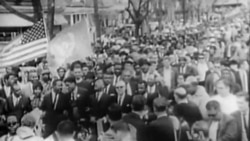Americans across the country are pausing Monday to observe the federal holiday marking the birthday of slain civil rights leader Martin Luther King Jr.
King first rose to prominence in 1955 when he led a successful boycott of the public buses in the southern city of Montgomery, Alabama, forcing the city to end its practice of segregating black passengers.
He became the central figure of the Civil Rights Movement of the 1950s and '60s, inspiring millions with his famous "I Have a Dream" speech during the 1963 March on Washington.
Nobel Peace Prize winner
He received the Nobel Peace Prize in 1964, the same year a landmark civil rights bill was signed by President Lyndon Johnson.
King was assassinated on April 4, 1968 in Memphis, Tennessee, where he had traveled to assist striking black garbage workers who were seeking equal pay.
The holiday was created in 1983 when president Ronald Reagan signed a bill designating the third Monday in January to honor King, who was born on January 15, 1929.
Congress designated the King holiday as a national day of service in 1994, a move aimed at encouraging Americans to take part in community projects.
WATCH: Related video
King's birthday celebration this year comes as a predominately African-American town in Michigan learns that it was not told for 1½ years that its residents had been drinking lead-contaminated water, putting the population, especially young children, on the path to irreversible illnesses.
Civil rights leader Jesse Jackson described Flint, Michigan as a "crime scene." Documentary filmmaker Michael Moore said the situation in his hometown is a "racial crisis" and a "poverty crisis."
The National Association for the Advancement of Colored People, or the NAACP, said in a statement Sunday, "To expose an entire city of nearly 100,000 residents, many of them children, to toxic lead is, if not criminal, is at the very least inhumane. ... Would more have been done, and at a much faster pace, if nearly 40 percent of Flint residents were not living below the poverty line? The answer is unequivocally yes."






